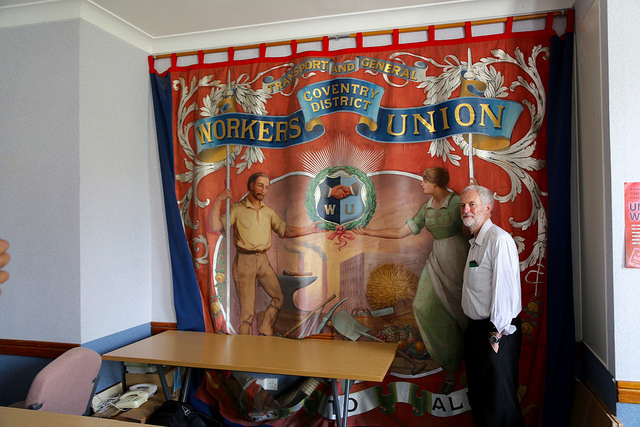Even if he wins, Jeremy Corbyn will never be able to lead the Labour Party
Jeremy Corbyn is the unlikely favourite for the Labour leadership, with leadership election rule changes and an influx of new members and supporters fuelling his rise. But what would result of his ascendency to the party’s top job? Eunice Goes, author of a forthcoming book about Ed Miliband’s leadership of the Labour Party, argues the Corbyn may end up in office but not in power, with internal opposition likely making his task so difficult as to be impossible.

Britain’s next Leader of the Opposition? (Credit Ciaran Norris, CC BY NC 2.0)
The Labour leadership contender Jeremy Corbyn seems to be enjoying his moment in the sun. After 32 years spent on the margins of British politics as a veteran left-winger and serial rebel backbencher, the Islington North MP is now filling Town Halls across the country from Glasgow to Ealing. But he has also created real panic amongst many Labour grandees who see his victory as inevitable. So much so that he might now wonder if it was really such a good idea to stand for the leadership of the Labour Party.
If Corbyn is elected (and a lot can happen until September 12 when the results will be announced) he will soon discover that his job as Labour leader will be hellish. Simply put, he will not be able to lead an extremely divided Labour Party. To demonstrate that this is very likely scenario it is worth remembering what happened to Ed Miliband in his almost five years as Labour leader.
Lessons from the Miliband era
Ed Miliband’s decision to turn the page on New Labour was seen by many party figures and media pundits as a heresy that had to be fought. That fight started on Miliband’s first day on the job and only ended when he resigned. In the early days of his leadership, many angry Labour voices claimed that Miliband’s victory was not legitimate because he did not win the vote of the majority of the parliamentary party. As this line of argument soon lost its novelty – and no one moved to oust Miliband – other criticisms started to be heard. Miliband was too left-wing, too wonky, too weird and his policies lacked credibility.
The Blairite wing – inside but also outside the House of Commons – was particularly disruptive and did everything to undermine his authority. Lord Mandelson was a case in point. He never wasted an opportunity to say that Miliband was wrong to deviate an inch from the New Labour rulebook. And when Lord Mandelson or the former Prime Minister Tony Blair were too busy with their daytime jobs to attack the Labour leader there were plenty of backbenchers and, occasionally, frontbenchers who fed stories to the media about how Miliband’s leadership was hanging by a thread. Needless to say, candid ‘warnings’ delivered by megaphone and stories about plots never help the standing of party leaders. Indeed, the aim of these attacks was to destabilise Miliband. But he did not budge from his position (he was never openly challenged). In the process Labour suffered too as voters tend to dislike disunited parties led by weak leaders.
Miliband also faced a hostile media. Over the period of five years, the right-wing media (which controls most newspapers in Britain and which is closely followed by the BBC) used two main frames to attack the Labour leader. The ‘Red-Ed’ frame routinely portrayed his proposals as either coming straight out of Stalin’s five year plans or from Hugo Chavez’s Venezuela, whilst the ‘weird-Ed’ frame showed Miliband as a politician who simply was not up to the job of Prime Minister.
As the May 7 electoral results have amply showed, these media frames had an impact on voting behaviour. Indeed, many voters still believe that the previous Labour government caused the global financial crisis and that the politics of austerity (which amounts to public spending cuts and regressive tax rises) is the only possible cure to eliminate the public deficit and debt.)
Ed Miliband was a flawed leader but the responsibility for the Labour’s colossal defeat on May 7 does not rest solely on his shoulders. Party divisions, plots, constant media attacks paralysed the party, in particular its policy development process. When the electoral manifesto was finally approved last spring the proposals that came out were confusing, unconvincing and uninspiring as Miliband tried to cater to all factions and ended up pleasing none. At the same time, he came across as an inadequate leader and Labour looked like an old-fashioned slogan machine.
Labour under Corbyn
If the powerful right wing of the party and the media could not stomach Miliband’s mild social democratic programme on the grounds that they were not credible and popular, it is very likely that Jeremy Corbyn’s redder politics will receive a much harsher treatment from pretty much the majority of the parliamentary party. Indeed, a Corbyn leadership is seen as a hopeless venture not only by the right of the party but also by its centre and soft-left.
A string of former Labour leaders – from Neil Kinnock to Gordon Brown, not forgetting, of course, Tony Blair’s forceful interventions – has tried to talk ‘some sense’ into Labour Party members and supporters. But as the warnings about Labour’s possible annihilation have done nothing to dampen Corbynmania other party grandees have already moved into plans B and C.
Treating Corbyn’s victory as unavoidable, John McTernan and Simon Danczuk have suggested a quick and clean coup. Others, wary of military junta tactics, are plotting a ‘resistance’ movement to fight the loony-left madness to which Corbyn will allegedly condemn the party. In this task, they will be assisted by an eager and angry chorus of media commentators.
It remains to be seen if any Labour MP has the courage to put plan B in action. After all no one had the courage to challenge the unpopular leaderships of Gordon Brown and Ed Miliband. But the resistance movement or the less-polite guerilla tactics suggested by some Plan C plotters will be as – if not more – destructive. Refusals to serve on the Shadow Cabinet, mass abstentions and rebellions, threats of splits and embarrassing stories planted in the media will be the defining features of the Labour Party under Jeremy Corbyn.
In these circumstances he will be de facto prevented from leading the Labour Party. The weekly duels in the House Commons with the Prime Minister David Cameron will be the least of Corbyn’s worries. He will be torn apart by his parliamentary party and the media. He will not be able to develop a single policy proposal, as he will be spending most of his time and energy explaining and justifying every single word he uttered during his long parliamentary career about Europe, Trident, coal mines, people’s quantitative easing or Israeli oranges. In other words, his leadership will collapse under pressure from opposition and resistance from all fronts.
But when this will happen the right of the party will have few reasons to rejoice as there is no greater electoral turn-off than to see – as we’ve witnessed in the past weeks – the spectacle of Labour apparatchiks treating the party’s membership and their democratic choices with such contempt.
—
This post represents the views of the author and not those of Democratic Audit or the LSE. Please read our comments policy before posting.
—
 Eunice Goes is associate professor at Richmond University’s School of Arts, Communications and Social Sciences. She obtained her PhD in political science at LSE in 2002. Her research interests lie in political parties and ideologies.She is the author of The Labour Party Under Ed Miliband: Trying but Failing to Renew Social Democracy, Manchester University Press, forthcoming.
Eunice Goes is associate professor at Richmond University’s School of Arts, Communications and Social Sciences. She obtained her PhD in political science at LSE in 2002. Her research interests lie in political parties and ideologies.She is the author of The Labour Party Under Ed Miliband: Trying but Failing to Renew Social Democracy, Manchester University Press, forthcoming.





 Democratic Audit's core funding is provided by the Joseph Rowntree Charitable Trust. Additional funding is provided by the London School of Economics.
Democratic Audit's core funding is provided by the Joseph Rowntree Charitable Trust. Additional funding is provided by the London School of Economics.
Forthcoming @ManchesterUP author @Eugoes waxes political on Labour leadership, via @democraticaudit
https://t.co/7OBFfVMenL
#books #corbyn
Labour under Corbyn: https://t.co/MxJNNfYMlg
[…] it has a robust system to prevent fraudulent or malicious applications. Moderate authoritarians. Even if he wins, Jeremy Corbyn will never be able to lead the Labour Party. Jeremy Corbyn is the unlikely favourite for the Labour leadership, with leadership election rule […]
Two good articles on the Corbyn business: https://t.co/XkYHgf3ECB and https://t.co/sR89eObdNK
Even if he wins, Jeremy Corbyn will never be able to lead the Labour Party https://t.co/T0loAZnzwD
A provocative and well argued piece on the barriers to a Corbyn leadership by @Eugoes on @democraticaudit https://t.co/Xk38HdSDx2
Even if he wins, Jeremy Corbyn will never be able to lead the Labour Party: Jeremy Corbyn is the unlikely favo… https://t.co/2AiJ4hQMLF
Even if he wins, Jeremy Corbyn will never be able to lead the Labour Party, says Eunice Goes https://t.co/oWiWgYuPpd
My take on a possible Corbyn leadership: Even if he wins, Jeremy Corbyn will never be able to lead Labour https://t.co/4E4Q3aFEKX
Even if he wins, Jeremy Corbyn will never be able to lead the Labour Party – Democratic… https://t.co/BiOnYYCBVD
Miliband faced a hostile media and a hostile Labour right wing led by Blair and Mandelson : Democratic Audit UK https://t.co/CkMXUuCAuS
Even if he wins, Jeremy Corbyn will never be able to lead the Labour Party https://t.co/ASPa8pz6It #Option2Spoil
I’m more optimistic than @Eugoes. A lot will depend on next May’s elections. If Labour do well, Corbyn will buy time https://t.co/T3VeKKXDV5
“Corbyn’s leadership will collapse under pressure from opposition and resistance from all fronts.” https://t.co/9d4BkZS2Id
Eunice Goes gives us the History of the Labour Party (2015-2020), and depressing reading it is too. https://t.co/VRZpJUAKaZ #corbymania
“Corbyn leadership is seen as hopeless venture by right of party & by centre and soft-left” https://t.co/9d4BkZS2Id https://t.co/O5CB8fLYra
Even if he wins, Jeremy Corbyn will never be able to lead the Labour Party.
Fascinating insight and analysi…https://t.co/11WaXjYuCb
“Rebellions, threats of splits … will be defining features of the #Labour Party under #Corbyn” says @Eugoes https://t.co/Ei6BOD7uJt
Even if he wins, Jeremy Corbyn will never be able to lead the Labour Party https://t.co/U6bBYOUbBQ https://t.co/6aPkW1ftYA